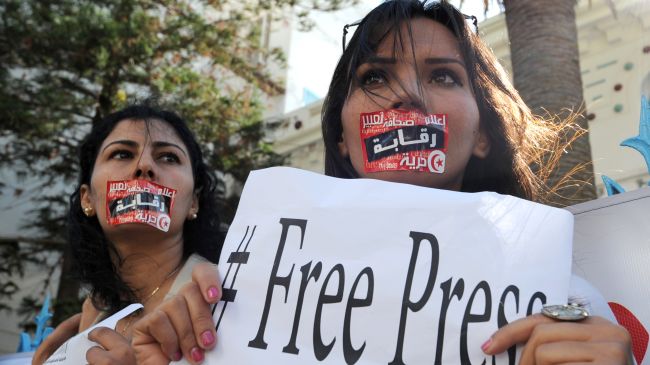TUNISIA'S MEDIA COMES OF AGE
Tunisian journalists: For a Free Media

TUNIS: With democracy, journalists in Tunisia are increasing the pressure on the government to help institutionalise a free, independent media. Work is in progress for setting up a Press Council for self regulation of the print media with a voluntary code of ethics, with an independent board of journalists and eminent persons.
President of the National Syndicate of Journalists, Neji Bghouri is in animated conversation with colleagues in his office in Tunis when we barge in. The Syndicate is housed in a beautiful little building, with Bghouri like most Tunisians conversant only in French. So it is left to journalist Zied Dabbar to translate answers, as well as add his own information to whatever questions we ask.
Dabbar says that progress is slow but steady, and that the terms and conditions of setting up the Press Council are being negotiated with the government. He is clear that like all journalists “we do not trust the government, we trust no government” but that unlike the Islamists the new dispensation does seem to be more interested in promoting a free, independent media. He and Bghouri point out that earlier, before the Revolution, the media in Tunisia did not enjoy freedom that has grown dramatically now under the democratic government.
The Syndicate is working to ensure that the government works out a level playing field for giving out advertisements, and not use this selectively to control and tame the media. Dabbar points out that earlier the Islamists used the media for propaganda but this has been gradually changing, with the media coming of age. He is highly critical of the terror attack, of extreme religiosity, and makes it clear that the media in Tunisia wants to be progressive and forward looking.
Freedom of the press is officially guaranteed but its not yet completely free. Earlier Tunisia had imposed censorship on the internet but this is now being withdrawn with Reporters without Borders including the country in its list of “Enemies of the Internet”. Now this international organisation is participating in the World Social Forum, along with 70,000 others swarming the city. More so as Tunisia has over 3.5 million regular internet users, reflected in the mushrooming of internet cafes across the country, known as ‘publinet.’
Five private radio stations have been set up and private television channels added. While one could not understand a discussion on one of these, clearly it was not without passion and heated argument leading to one of the participants standing up and leaving the studio. He was one of two guests, and the walk out followed a shouting match in which both seemed to be getting the worst of the other.
Radio seems to be popular too with its fair share of entertainment. Judging from a taxi driver’s responses, a play that he was listening to full blast in the cab was clearly hilarious. He kept laughing throughout, quite oblivious of the passengers laughing along with him.
Tunisia has overcome the first hurdles of elections, a Constituent Assembly and a Constitution. To understand how commendable this is, Indians just need to look at Nepal that has entered a logjam from which there seems to be no escape. At least at the moment. The media recognised by the journalists as the pillar of democracy is now being worked upon, with the government clearly following the journalists on this route. As Dabbar said, “we are powerful now, the government is scared of us and will do what we say.” But he was clear that power has to be with responsibility and ethics, “it cannot be crazy!”
Any journalist listening at home?!



